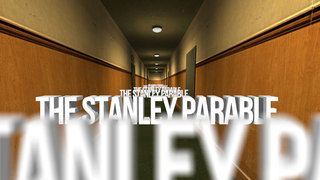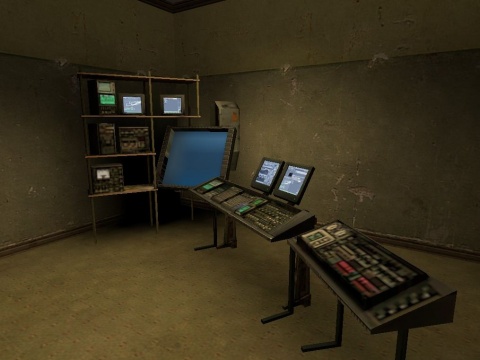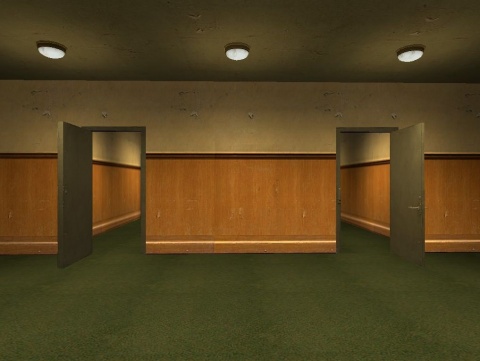The Stanley Parable
 Is The Stanley Parable a game? Does it matter? We're about to present
our impressions for a title that doesn't really fit any existing
definition. The Stanley Parable is sort of an experiment in game design,
but also presents questions in how storytelling influences gameplay.
Saying anything more would be saying too much, it's a short experience
that will have you questioning previous games you have played and their
intentions.
Is The Stanley Parable a game? Does it matter? We're about to present
our impressions for a title that doesn't really fit any existing
definition. The Stanley Parable is sort of an experiment in game design,
but also presents questions in how storytelling influences gameplay.
Saying anything more would be saying too much, it's a short experience
that will have you questioning previous games you have played and their
intentions.
Our impressions for The Stanley Parable are unique in that all three of us "beat" the "game." And six times each, no less. This isn't an amazing feat, as six times through Stanley would still leave time on a clock for a first hour review, but it also made me question whether I should be filing this under a full review instead of an impression. This game makes me ask too many questions.
So I apologize if we're too vague, but The Stanley Parable experience suffers from over-explanation to those who haven't played it. Here we go.
Nate
It's difficult to say what The Stanley Parable actually is. I definitely couldn't call it a game. It's interactive, but there's nothing to win or lose or accomplish, just some things to do and choices to make. But describing Stanley at length would probably be counterproductive to the experiencing it anyway.
Because my brain is primarily attuned to video games, it's easiest for me to compare The Stanley Parable with other games. Just about every other game is built like a mathematical calculation: you have a task, and you're to work through it until you find the answer. Even games with no clear finale, like Minecraft, often have some implied objectives or room to create your own. The Stanley Parable is more of an introspective question, in that your takeaway will depend entirely on your own perceptions.
For me, The Stanley Parable examined the interactions between developer, player, and character, playing up the conflicting interests of each. It exposed the contradiction of player choice in a closed computer program, but also glorified that contradiction. It was a video game about playing video games. For well-rounded folks with a worldview that stretches longer than a controller cord, The Stanley Parable might concern the meaning of life, the value of freedom, or something else that doesn't celebrate my thumb dexterity with a high score so I don't care. But for those people, it could, I guess.
I did find it annoying that I had to re-download Half-Life 2 to my MacBook just to play this mod. The process took about three hours, and then I played the game for 40 minutes and saw everything it offered (according to the included "Author's Commentary.txt"). Normally this would just make me curse and moan and write nasty things on the internet, but maybe I'll just think about it instead and come to some grand revelation about the concept of time. That's the effect The Stanley Parable seems to be having on people.
Greg
I've never been very good at articulating my thoughts on artistic or philosophical things, so describing my impressions of The Stanley Parable are honestly difficult. It's basically a game that presents you with a series of choices and the paths you take lead to different narration and different locations. The narrator is one of those in-your-head kind of guys who you can listen to closely and follow his directions (probably your first time through) or you can blatantly disregard what he says and go where you want.
Maybe I have the wrong type of brain for this sort of thing, but I was mostly concerned with mapping out all the decisions in the game in my head and figuring out the way I could most efficiently try them all out. I was actually thinking in my head, "maybe the author wanted to find out if gamers do breadth-first or depth-first searches in the decisions they make in video games?" Kind of ridiculous. Me, not the game.
But there are a few endings that stick out, and I think they raise some really interesting questions when it comes to game design: Do gamers have free will? Is free will in games just a really fancy construction of many more rules? Have game designers Pavlovian trained gamers to react to the tinkling bell? People could write dissertations on the questions this game raises. That said, I don't think The Stanley Parable is any kind of "must-play" experience that transcends the medium, it's more just... a curious way to spend an hour.
Steve
The Stanley Parable is certainly an experience worth playing. It's both entertaining and thought-provoking, and perhaps the best answer yet to the question if interactive games can truly tell a complex story while simultaneously being art (that's not hindered by the limitations of the medium). This is a very short, branching narrated game that puts you in the shoes of a character's life, where most situations seem to be outside his control. The narration and gameplay both draw parallels to the theory of gaming and even deterministic life in general. It's unquestionably worth your time to try this free Source mod. The experience as you play further and understanding that grows are entirely unique in the gaming, as far as I'm aware. Single playthroughs are over in a matter of minutes, and it will take about an hour or so to discover each path and ending, so there is not much reason to avoid playing this, so long as you have access to the Source engine. Lastly, I do not wish to influence anyone's own personal playthrough experience, so I'll leave my impression short and a bit vague.


